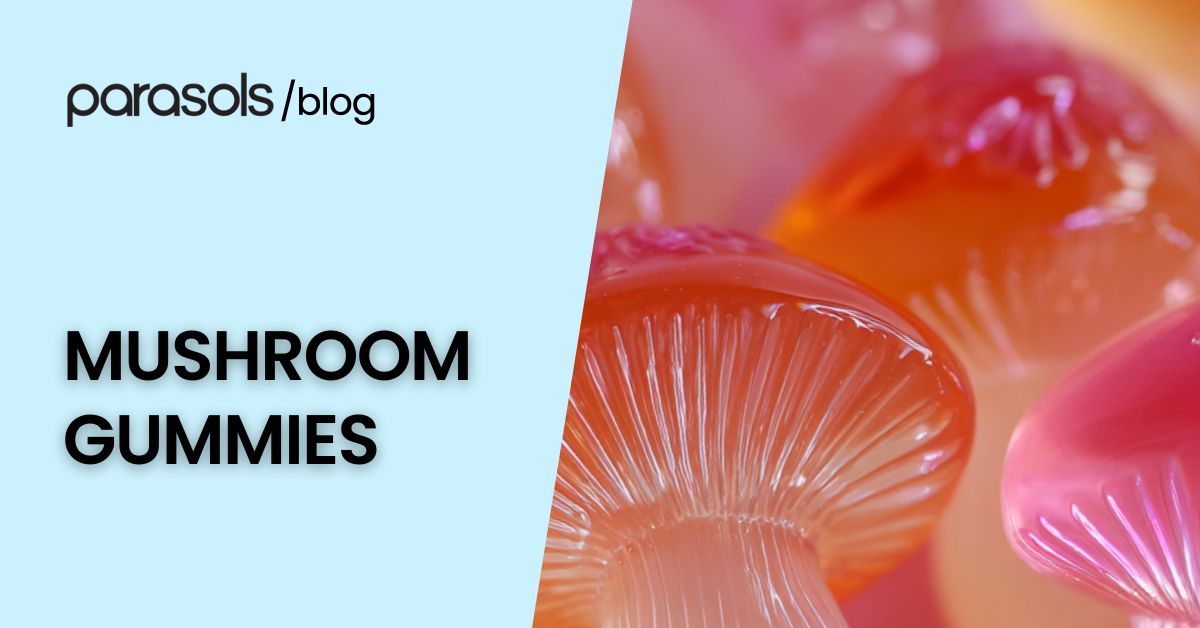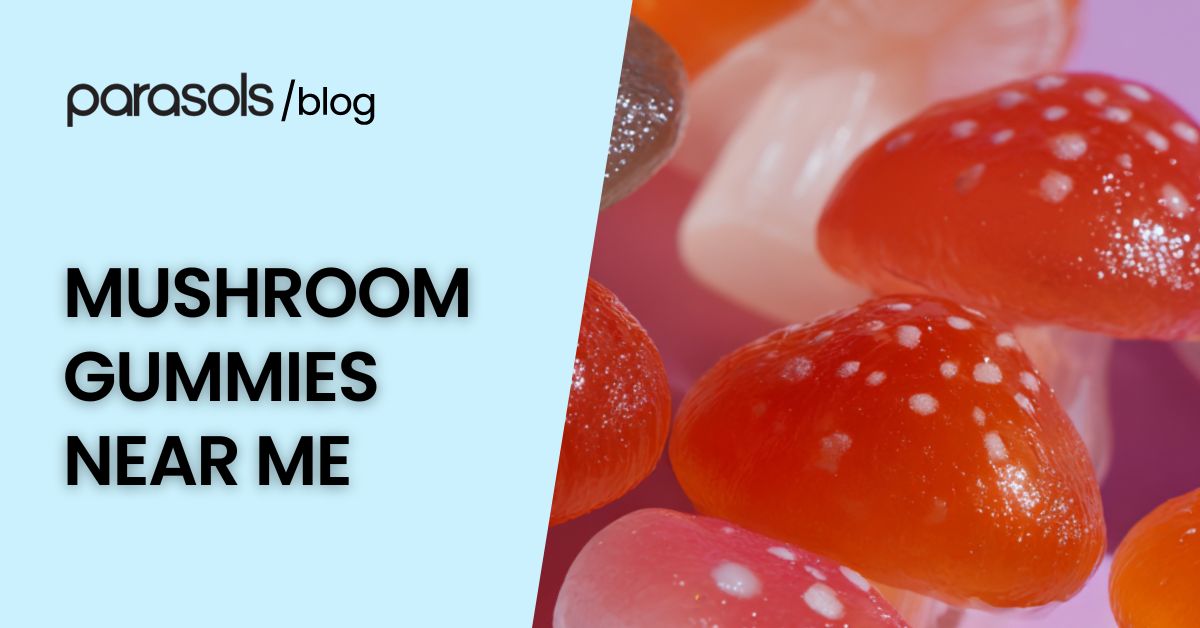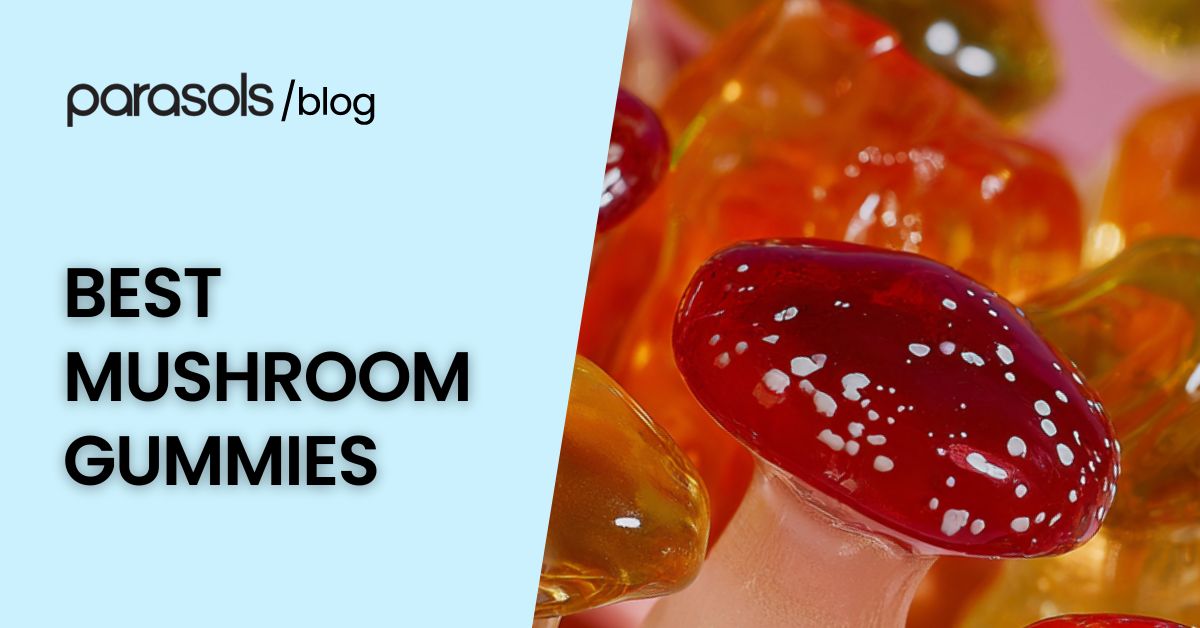In 2025, mushroom gummies are everywhere—from wellness shops and smoke shops to online retailers like Amazon. Marketed as a convenient way to boost immunity, enhance mental clarity, and support overall health, these chewy mushroom edibles have surged in popularity. But amid flashy branding and health claims, questions linger about safety, efficacy, and regulation.
Are these gummies truly functional supplements or just another unregulated health trend with potentially harmful effects? Let’s unpack the science, ingredients, and controversies behind the highest-rated mushroom gummies of the year.
What are Mushroom Gummies?
Mushroom gummies are chewable supplements or edibles that contain concentrated extracts from various types of functional mushrooms. Parasols offer our own mushroom gummies like our pineapple non detect shroom gummies. Often marketed as nootropic or adaptogenic products, they aim to support mental clarity, immunity, and overall health.
Some varieties include psychoactive substances like muscimol, ibotenic acid, or psilocybin, which can produce hallucinogenic or opioid-like effects, while others focus solely on non-psychoactive mushroom blends. Typically made with ingredients like pectin, citric acid, sodium citrate, and carnauba wax, these gummies are available in vegan, non-gmo, and sugar-free options..
Benefits of Mushroom Gummies
Mushroom gummies are praised for their wide-ranging health benefits, depending on the type of mushroom used. Here’s a breakdown of the most common advantages:
Cognitive Support
Gummies containing lion’s mane are known to boost cognitive performance, enhance memory, and support mental clarity thanks to their nootropic properties.
Immune Defense
Blends with reishi, chaga, turkey tail, and maitake may help strengthen the immune system through adaptogenic and antioxidant compounds.
Energy and Stamina
Cordyceps-infused gummies are often used to increase energy levels and improve physical endurance, making them popular among athletes and active individuals.
Stress and Mood Balance
Reishi and other adaptogenic mushrooms are linked to reduced stress and improved mood regulation, offering a natural way to support emotional well-being.
Convenient Supplementation
As a tasty and portable format, mushroom gummies offer an easy alternative to capsules or powders, making it simpler to incorporate functional mushrooms into a daily health routine.
Popular Ingredients Used for Shroom Gummies

Mushroom gummies often feature a mix of functional and supportive ingredients designed to enhance health effects and improve taste and texture. Common components include:
- Lion’s Mane – A nootropic mushroom that may support memory, focus, and cognitive function.
- Reishi – Known for its calming and adaptogenic effects, often used to reduce stress.
- Chaga – Rich in antioxidants, used for immune defense and inflammation control.
- Cordyceps – Helps boost energy, stamina, and physical performance.
- Turkey Tail – Supports gut health and immunity with prebiotic compounds.
- Maitake – May regulate blood sugar and support immune function.
- Psilocybin or Psilocin – Found in psychedelic mushrooms, sometimes included in unregulated or gray-market products for hallucinogenic effects.
- Muscimol and Ibotenic Acid – Psychoactive compounds from Amanita mushrooms, associated with altered states and potential risks.
- Pectin – A plant-based gelling agent used in vegan gummies.
- Citric Acid & Sodium Citrate – Added for flavor and preservation.
- Carnauba Wax – Used to coat and prevent gummies from sticking.
- Undisclosed Ingredients – Sometimes listed vaguely, raising concerns about transparency and safety.
Tips for Consuming Magic Mushroom Gummies
Magic mushroom gummies, often containing psychoactive compounds like psilocybin or muscimol, require careful and informed use. Here are essential tips for consuming them safely:
- Start Low – Begin with a low dose (e.g., 1 to 2 gummies) to gauge your body’s response, especially if you're new to psychedelics.
- Check the Label – Look for lab-tested products with clear ingredient disclosures to avoid undisclosed or potentially harmful substances.
- Avoid Mixing – Don’t combine with alcohol, prescription medications, or other psychoactive substances to reduce the risk of adverse effects.
- Set and Setting – Consume in a safe, comfortable environment with a trusted person present, especially for higher doses.
- Stay Hydrated – Drink water and maintain nutrition during the experience to support overall well-being.
- Understand Legal Status – Be aware of local laws, as products with psilocybin or similar compounds remain unregulated or illegal in many areas.
- Know the Risks – High doses or unregulated products may lead to hallucination, seizure, or serious health complications—consult a professional if unsure.
Mushroom Gummies Vs Other Shroom Edibles
|
Feature |
Mushroom Gummies |
Mushroom Chocolates |
Mushroom Capsules |
Mushroom Teas |
|
Form |
Chewable, gummy-texture |
Solid, chocolate-based |
Powder in gelatin or vegan capsules |
Brewed liquid infusion |
|
Common Ingredients |
Pectin, citric acid, lion’s mane, reishi, psilocybin, muscimol |
Cocoa, sugar, psilocybin, functional mushroom blend |
Dried mushroom powder (lion’s mane, chaga, etc.) |
Dried mushrooms, lemon, ginger, honey |
|
Taste |
Fruity, candy-like, often masks mushroom flavor |
Sweet, chocolatey, can mask bitter taste well |
Neutral, depends on capsule coating |
Earthy, sometimes bitter unless flavored |
|
Onset Time |
30–60 minutes |
30–60 minutes |
45–90 minutes |
15–30 minutes (quicker absorption) |
|
Duration |
4–6 hours (psychoactive variants) |
4–6 hours |
4–7 hours |
3–6 hours |
|
Dosage Control |
Easy to microdose (e.g., 1–2 gummies per serving) |
Moderate control per piece |
Highly precise |
Harder to dose without scales |
|
Shelf Stability |
Moderate (heat sensitive) |
Moderate to low (melts in warm temps) |
High |
Low (must be freshly prepared) |
|
Discretion |
High – resembles regular candy |
Moderate – less discreet due to smell and shape |
High – looks like a standard supplement |
Low – requires prep and equipment |
|
Vegan Options |
Often available (pectin-based) |
Rare – most use dairy |
Available |
Yes, depending on prep |
|
Legal/Regulatory Concerns |
Often unregulated, may contain undisclosed ingredients |
Same as gummies – unregulated, gray-market |
More common in legal nootropic blends |
Varies by ingredient and preparation |
|
Health Risk |
Potentially harmful if misdosed or contains ibotenic acid or muscimol |
Similar risks, especially in untested blends |
Low with reputable brands |
Lower, but dependent on mushroom source |
Final Thoughts

In a market flooded with wellness claims and curiosity about psychedelics, mushroom gummies stand out as both a health trend and a point of controversy in 2025. While they offer convenience, functional benefits, and variety, their safety and effectiveness can vary widely depending on ingredients and regulation. As with any supplement—especially those with psychoactive properties—consumers should stay informed, cautious, and selective when choosing which mushroom edibles to try.
Frequently Asked Questions
Are mushroom gummies safe for children or pets?
No, mushroom gummies—especially those containing psychoactive compounds—are not safe for children or pets and should be stored securely out of reach.
How should mushroom gummies be stored?
Store them in a cool, dry place away from heat and sunlight. Some may require refrigeration depending on the ingredients and manufacturer recommendations.
Can I take mushroom gummies daily?
Many functional mushroom gummies designed for immunity or cognitive support are safe for daily use, but it’s best to follow the product's dosage guidelines and consult a healthcare provider.
Do mushroom gummies show up on a drug test?
Psychoactive mushroom gummies containing psilocybin or similar compounds could potentially trigger certain drug tests, though standard tests often don’t screen for these substances.
What’s the difference between functional and psychedelic mushroom gummies?
Functional mushroom gummies contain non-psychoactive ingredients like lion’s mane or chaga for health benefits, while psychedelic versions include hallucinogenic compounds like psilocybin or muscimol.
Can I use mushroom gummies alongside other supplements?
It depends on the ingredients and your personal health condition. Always check for potential interactions and consult with a healthcare provider if you're taking other dietary supplements or medications.
How long do mushroom gummies last before expiring?
Shelf life varies, but most commercially produced mushroom gummies are good for 6–12 months when stored properly. Check packaging for exact expiration dates.



Leave a comment
This site is protected by hCaptcha and the hCaptcha Privacy Policy and Terms of Service apply.